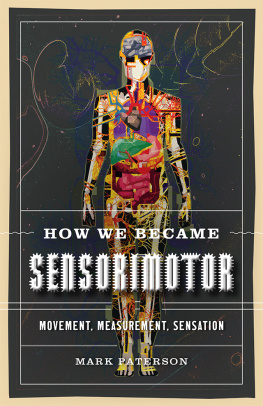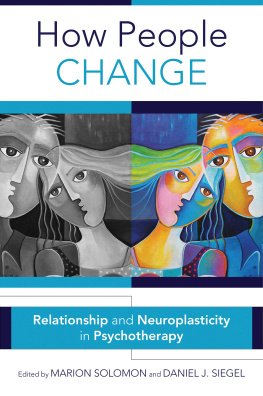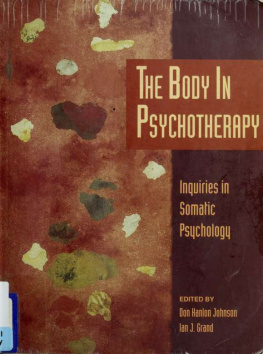Contents
Guide
Page List
THE NORTON SERIES ON INTERPERSONAL NEUROBIOLOGY
Louis Cozolino, PhD, Series Editor
Allan N. Schore, PhD, Series Editor, 20072014
Daniel J. Siegel, MD, Founding Editor
The field of mental health is in a tremendously exciting period of growth and conceptual reorganization. Independent findings from a variety of scientific endeavors are converging in an interdisciplinary view of the mind and mental well-being. An interpersonal neurobiology of human development enables us to understand that the structure and function of the mind and brain are shaped by experiences, especially those involving emotional relationships.
The Norton Series on Interpersonal Neurobiology provides cutting-edge, multidisciplinary views that further our understanding of the complex neurobiology of the human mind. By drawing on a wide range of traditionally independent fields of researchsuch as neurobiology, genetics, memory, attachment, complex systems, anthropology, and evolutionary psychologythese texts offer mental health professionals a review and synthesis of scientific findings often inaccessible to clinicians. The books advance our understanding of human experience by finding the unity of knowledge, or consilience, that emerges with the translation of findings from numerous domains of study into a common language and conceptual framework. The series integrates the best of modern science with the healing art of psychotherapy.
THE POCKET GUIDE TO
SENSORIMOTOR
PSYCHOTHERAPY
IN CONTEXT
PAT OGDEN

A NORTON PROFESSIONAL BOOK
This e-book contains some places that ask the reader to fill in questions or comments. Please keep pen and paper handy as you read this e-book so that you can complete the exercises within.
For Brennan
With boundless gratitude for all you do,
and even more for all you are.
CONTENTS
The inspiration for this book emerged in 2015, after a UCLA/Lifespan Learning Institute Interpersonal Neurobiology conference on the topic of multiculturalism. In 2014, distressed by the murders of Black people (including Michael Brown Jr., Ezell Ford, Eric Garner, Akai Gurley, Laquan McDonald, Tamir Rice, Yvette Smith) taking place in the U.S., I had proposed that we choose the theme of diversity and culture for the 2015 conference, not realizing that delving into this topic would catalyze a profoundly disturbing, yet rewarding, ongoing learning journey for me and the organization I founded in 1981, the Sensorimotor Psychotherapy Institute (SPI). With an ignorance typical of white people who fancy themselves as not racist, I naively thought I had a handle on diversity issues at that time. In the 1960s, I started my career as the only white teacher in an all-black public school, then taught at the first integrated classroom in Louisville, KY. I passionately participated in the Civil Rights Movement of that era. And, my family is mixed race. But none of these experiences safeguarded me from my own implicit bias, white fragility, and internalized racism, or meant that I had a handle on systemic oppression or white privilege. Through collaboration with Dr. Medria Connelly, Dr. Brian Nichols, and others in preparation for the conference, I had to come to terms with the fact that I had limited awareness of white privilege, what it means to be a member of the dominant culture, privilege/oppression dynamics, or the implicit racial bias that is inherent within myself, in the U.S., in the world, and in my profession. Through presenting at and participating in the conference on culture, I became acutely aware of my own and my white colleagues lack of knowledge about the impact of white supremacy and its influence in our field. Although racism affects us all in different ways, I realized that it was exactly because of my privilege that I had been protected from suffering the direct effects of the injustice, racism, and systemic oppression. As a white person of privilege, I am not immediately faced with, and therefore often not aware of, the constant disadvantages, pervasive microaggressions, implicit bias, and institutionalized racism that marginalized people face every daypersonally, professionally, in the media, and in political discourse. The more I studied and reflected, the more I felt chagrined and ashamed that I had participated as a leader in our field with such a paucity of awareness and knowledge, unwittingly perpetuating Eurocentric perspectives that not only left out but at times sought to dominate most marginalized people and the wisdom of their healing traditions and practices.
Once the veil began to lift, there was no turning back. I wanted to delve more deeply into these issues, both for myself personally and for my school, to examine and change the ways in which I myself and SPI have participated in perpetuating privilege oppression dynamics. I initiated a Think Tank at SPI to explore issues of diversity and oppression that over time came to include the coauthors of the first chapter of this book: Sherri Taylor, Laia Jorba, Raymond Rodriguez, and Mary Choi. Our purpose was to create a process of moving SPI from a reactive position to a proactive position with respect to systemic oppression and racism. It was a process that would involve integrating diversity, inclusion, and cultural humility into SPI culture, into everything we do, with the intention of becoming an organization that upholds an anti-racist and anti-oppression perspective and holds itself accountable to anti-racist and anti-oppressive practices. These four coauthors are a mix of Sensorimotor Psychotherapy Institute graduates, Think Tank members, trainers, consultants, and talented Sensorimotor Psychotherapists who have made social justice and sociocultural awareness the center of their work and who are my teachers in these arenas. Together, we spearheaded an exploration of racist issues and provided consultation and education to the staff and trainers of SPI on anti-racist, anti-oppression lenses, starting with designing and conducting an Inservice on Racism, Intersectionality and Implicit Bias. We have been meeting regularly now for several years.
When Deborah Malmud, vice president of Norton, suggested I publish a new book, A Pocket Guide to Sensorimotor Psychotherapy, consisting primarily of previously published chapters of mine, I immediately knew the focus needed to be on sociocultural sensitivity and skill. I asked my colleagues to coauthor a new chapter, Sensorimotor Psychotherapy in Context: Sociocultural Considerations, and to become consultants and collaborators in revising the remainder of the chapters that I had already written to include diversity, cultural humility, and an anti-racism, anti-oppression platform. We worked closely together to incorporate perspectives from the wisdom of each of our various social locations and identities. By the time I wrote the final new chapter on the principles that guide Sensorimotor Psychotherapy practice, a topic dear to my heart, I was able to better incorporate a sociocultural lens myself, integrating what I had learned from them and others.
Our process of writing and collaborating was both intensely rewarding and intensely challenging. With each of us having different voices, different experiences, and different social locations, we experienced the difficulties of conversing about race and oppression. We discussed, debated, agreed, disagreed, sometimes reaching agreement and sometimes not. As often happens, we found that the dynamics of privilege/oppression that we were writing about and hoping to disrupt were influencing our own group. Collectively and individually we confronted our feelings of being imposters, our sense of not knowing enough, of internalized oppression, of privilege, of not being good enough. As a present-moment experience lived every day for BIPOC, internalized oppression is not something that happened in the past and is now resolved, and writing brought these issues to the fore. Additionally, for my collaborators, the topics we addressed in the book at times touched on a lifetime of intergenerational trauma and systemic oppression. We all had our different struggles. Personally, I was faced with the harm white people, the group to which I belong, had perpetrated on others, and felt the pain of inheriting this legacy of oppression and colonization. I constantly doubted my own insights and questioned whether I might be inappropriately exerting my privilege as the only white person in our group, the founder of the work, and the senior, more experienced author. After much feedback from and discussion with my collaborators, I finally began to realize and come to terms with the prejudice and microaggressions against women, and me personally, in my profession and career. Thus, the dynamics of our diverse group were emblematic of the struggles of our society, and we learned and grew through our own grappling with these issues.
Next page













